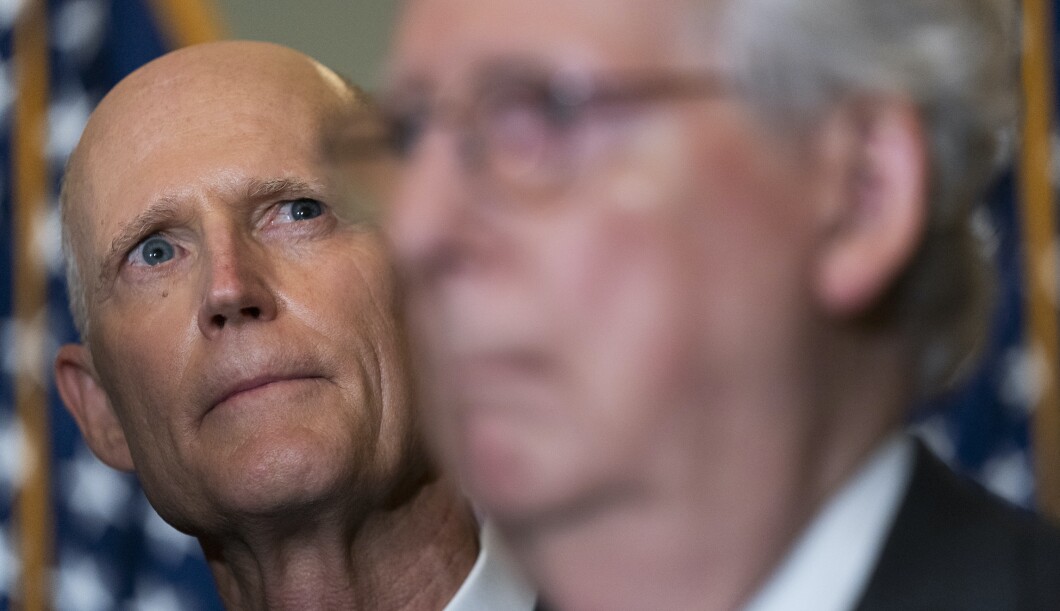
Sen. Rick Scott ended last year with a failed leadership challenge to Mitch McConnell (R-KY), but as a new Congress gets underway, the Florida Republican is making clear his feud with the Senate minority leader is only just beginning.
The onetime Florida governor and former head of Senate Republicans’ campaign arm is continuing a war of words with McConnell, foreshadowing what could be a tumultuous 2023 with looming legislative battles on the horizon.
LAWMAKERS HEADED FOR A BIG PARTISAN STANDOFF OVER THE DEBT LIMIT IN 2023
Scott recently launched a nationwide television ad calling for change within the Republican Party and urging his GOP colleagues to “stop caving in” to the demands of Democrats. The rallying cry was the premise for his run for minority leader, and even though he lost — Scott only received 10 votes — the bid was viewed as symbolic and marked the first time McConnell had ever faced a challenge in his 16-year tenure leading Senate Republicans.
“People told me not to run for Republican leader against Mitch McConnell. They said I wouldn’t win. I knew it was going to be hard. But we’ve got to start somewhere,” Scott said, standing in front of a star-spangled background.
The seven-figure ad spot is running nationally, including in every market in Florida, where the senator is up for reelection in 2024. Last week, he embarked on a statewide tour, touting a legislative agenda he plans to pursue in Congress despite being a member of the minority party in the upper chamber.
In the ad, Scott doubled down on an 11-point plan that proved to be midterm fodder for Democrats, who argued that its call for legislation to be renewed every five years would put popular programs such as Medicare and Social Security “on the chopping block.”
Scott, the head of the National Republican Senatorial Committee during the 2022 cycle, predicted Republicans had a pathway to a 55-seat majority and was critical of McConnell, who said late this summer that the fight for the majority would be incredibly close. Republicans wound up winning only 49 Senate seats.

The feud that developed between the two senators centered on a disagreement over messaging. McConnell wanted the election to be a referendum on President Joe Biden‘s agenda, while Scott wanted to promote a platform of what a Republican Senate would do as well.
The Florida senator ultimately blamed Republicans’ lackluster midterm performance on the Senate minority leader for compromising with Democrats on critical legislation and failing to inspire voters. He also rejected McConnell’s view that former President Donald Trump was the problem.
However, Scott has been blamed by some for the GOP’s inability to take back the Senate. Following the election, Sens. Thom Tillis (R-NC) and Marsha Blackburn (R-TN) called for an audit of the NRSC.
The former Florida governor continues to count Trump, who initially pushed Scott to challenge McConnell for his job, as an influential ally. Trump seems to delight in taking aim at McConnell; just this week, he encouraged Republicans to mount primary challenges against the Kentucky Republican and any GOP lawmaker who votes with him. Trump also criticized McConnell’s handling of last year’s omnibus spending bill, which was a point of contention among right-wing conservatives who ultimately held up Rep. Kevin McCarthy’s (R-CA) bid to become speaker until he won on the 15th ballot.
Scott continues to attack McConnell. In an interview with Politico, the Florida senator questioned why he attended an event with Biden last week to tout the infrastructure bill. “I believe we have got to have a change in leadership,” Scott said.
In a separate interview this week with WIOD, the first-term Republican senator downplayed McCarthy’s turbulent election to become House speaker and compared it to his own challenge to McConnell.
“I think the fight they had in the House over a leader, over a speaker, is going to be good because we’re going to start doing some of the things that Republicans in this country care about,” Scott said Tuesday. “I’ve got a very good working relationship with Kevin McCarthy. I think it was very positive. We’re going to start doing things that people care about around the country.”
The federal government is on track to max out its $31.4 trillion borrowing authority as soon as this month, setting up a clash in both chambers. Scott, along with conservatives such as Sens. Mike Lee (R-UT) and Ron Johnson (R-WI), have already said they will insist on budget reforms when they negotiate the limit on government borrowing next year. Democrats and the Biden administration have said they intend to stand firm and won’t allow Republicans to pressure them to cut federal programs.
Scott pointed to his 2021 proposed amendment to the Senate Republican Conference that commits to raising the debt ceiling only if it also secures spending reforms.
“I’ll be fighting with every tool at my disposal to enforce this rule that every Republican in the Senate agreed to follow,” Scott said in a statement released on Wednesday. “A day of reckoning is coming.”
“I look forward to working with House Republicans so we can stop caving to the Democrats, finally end Biden’s raging inflation crisis and bring fiscal sanity back to Washington,” Scott added in a veiled attack on McConnell.
CLICK HERE TO READ MORE FROM THE WASHINGTON EXAMINER
The self-proclaimed “Breakfast Club” of conservative Republican senators has already shown its willingness to make the legislative process painful. They were ultimately able to delay the vote on the omnibus late last year and threatened to cause a government shutdown. They didn’t move forward with those threats, but instead, the senators were offered a number of amendments to the legislation in order to secure their agreement to fast-track the bill.
Sens. Scott, Lee, Johnson, Rand Paul (R-KY), and Mike Braun (R-IN) all railed against the omnibus as emblematic of Washington dysfunction, saying they didn’t have time to read the bill and felt the process was rushed.
“This is why we’re $31 trillion in debt because of stuff like this,” Lee said. “Four or five people in Congress wrote this. And they put it together. They introduced it in the middle of the night, early morning. And now, they’re wanting to collapse all hearings of floor debates or discussions in earnest about this.”
The group has made clear it’s looking to grow its influence in the next session of Congress. Scott and other like-minded Republicans plan to continue to be a thorn in McConnell’s side.
Before the end of the year, Senate Republicans met in a closed-door session demanded by Scott and half a dozen others who pressured McConnell and the rest of their colleagues to pursue more confrontational negotiating tactics in talks with Biden and the Democrats over the next two years.
McConnell’s office did not respond to a request for comment.







